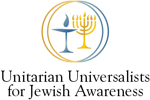Shabbat at GA – Friday, June 20th (location & time TBD) on Zoom
Click here to register
High Holy Days Shabbat- Friday, September 26th 8 pm ET / 5 pm PST on Zoom
Click here to register
Chanukah Shabbat – Friday, December 19th 8 pm ET / 5 pm PT on Zoom
Click here to register
Mussar Study Group – Begins Sunday, April 27th at 4 pm ET / 1 pm PT on Zoom
This group will meet on the 4th Sunday of each month
Click here to register
All events via Zoom unless noted differently. Registration links will be updated as available.
